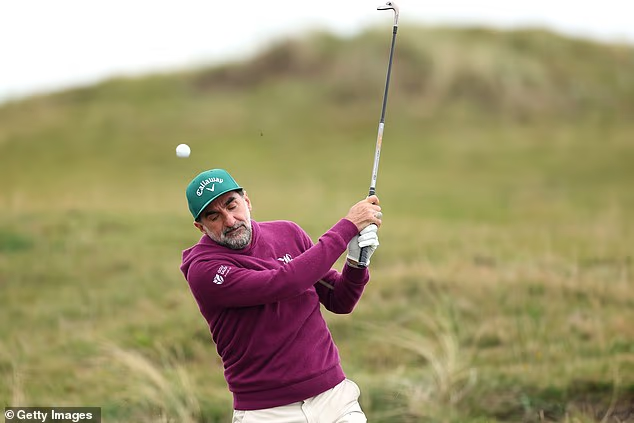Title: Yasir Al-Rumayyan: Navigating the High-Stakes World of Golf Amidst Financial Turbulence
In the complex landscape of sports management and investment, few figures loom as large as Yasir Al-Rumayyan, the governor of Saudi Arabia’s $1 trillion sovereign wealth fund. Often considered a powerful influencer capable of swaying international markets, Al-Rumayyan lately finds himself in a precarious situation, where even immense financial resources offer no assurances. His endeavor in the golfing world, primarily through LIV Golf, finds itself under scrutiny as financial challenges mount and strategic decisions weigh heavily on the future of the sport.
This month has been particularly challenging for Al-Rumayyan, beginning with staggering losses recorded within the financial accounts of LIV Golf. The situation peaked during the Alfred Dunhill Links Championship held in Scotland, where Al-Rumayyan participated in the pro-am tournament alongside Patrick Reed, a golfer often critiqued within the sport. Together, they concluded their outing at 108th out of 168 teams, a disappointing result that contrasted sharply with the high stakes involved in the world of professional golf.
Despite the unfavorable outcome, Al-Rumayyan remained upbeat, showcasing resilience that is often vital in competitive sports. His spirit came alive during a celebratory event where he sang “Sweet Caroline,” underscoring not just his passion for golf but also his desire for acceptance within this elite community. In an industry riddled with challenges, maintaining a positive outlook may serve him well as he navigates the ongoing turbulence surrounding LIV Golf.
However, the jubilation from the tournament was momentarily overshadowed by disheartening financial reports reflecting LIV’s dire situation. Recent filings indicated that while 2024 projected significant revenues of £64.9 million, the losses had escalated to a staggering £461.8 million. These figures paint a troubling picture of sustainability, raising pressing questions about the long-term viability of this lucrative venture into professional golf entertainment.
The overall financial outlay from Saudi Arabia across LIV’s first four seasons is an estimated £4 billion, yet the returns remain undisclosed, prompting further scrutiny. Observers note a major concern: the broader implications of LIV’s financial health could potentially threaten its influence on the global stage and within the golfing community, a sentiment echoed by industry insiders.
Within this context, discussions about LIV’s future intensify as the organization struggles to secure a sustainable formula while overshadowed by its absence from world ranking points and limited access to major tournaments. Players face contract uncertainties and sporadic income, adding further strain to an organization already grappling with the consequences of aggressive spending and competition from established tours, namely the PGA and DP World Tours.
Despite a framework agreement between LIV’s Saudi Public Investment Fund and the PGA Tour, the progress toward reunification has been slow and riddled with complications. This lingering uncertainty has resulted in skepticism regarding the merger’s potential benefits, particularly as the PGA Tour appears increasingly self-reliant due to significant financial injections from strategic partners. Industry insiders speculate LIV could soon face a scenario where its continued existence depends more on ingenuity than on vast financial reserves.
On the taxpayer-funded front, the reality is stark; LIV draws on considerable support from wealthy investors but has struggled to create an appealing product. A combination of aging players and stagnant growth adds to the volatile climate. Talents like Dustin Johnson and Bryson DeChambeau face contract renewals, with uncertainties swirling around whether they will resign, thus heightening the specter of market destabilization should they choose to leave.
As LIV navigates transition periods, new signings have become increasingly rare. Players like Jon Rahm have made headlines with their transitions to LIV, yet since then, the organization has grappled with lower-profile acquisitions, leading many to wonder about its ability to entice elite golfers as competitors. DeChambeau’s influence as a key player further complicates matters, as his growing popularity in the leisure world could prove pivotal for LIV’s appeal moving forward.
In contrast, relationships appear strained within the community, particularly with the DP World Tour, which is tied to the PGA Tour through a strategic alliance. This long-standing arrangement, viewed by LIV’s backers as a limitation, raises the question: Could there be a future where a collaboration between the two organizations emerges? Some insights suggest that discussions about co-existence are ongoing but remain tenuous amid the prevailing climate of suspicion and animosity.
Efforts to innovate and adapt are essential to ensure the long-term viability of LIV Golf. The organization has explored partnerships and growth opportunities beyond traditional tournament formats, aiming to attract younger audiences and revitalize interest. However, the path forward remains fraught with challenges, underscored by financial realities that force a reevaluation of priorities and strategic objectives.
As Yasir Al-Rumayyan and his team at LIV Golf grapple with these challenges, the question of whether their ambitions for a world-redefining golf tour align with the shifting landscape of professional sports remains paramount. Like any successful enterprise, their ability to adapt and negotiate the changing tides in both business and sport will determine LIV Golf’s legacy in the years to come.
Navigating a sector steeped in tradition and allegiance, Yasir Al-Rumayyan stands at a critical juncture, where the passions of the game must reconcile with the harsh realities of finance, competition, and legitimacy. The coming months will be telling about whether LIV Golf can evolve into a cornerstone of professional golf or face the fate of many lofty ventures that failed to capitalize on their initial promise and investment.


